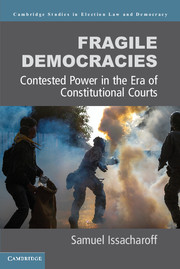Book contents
1 - The American Paradox
from PART I - MILITANT DEMOCRACY
Published online by Cambridge University Press: 05 July 2015
Summary
In 2010, retired Justice Albie Sachs of the South African Constitutional Court was giving a series of lectures on his recently published autobiography, The Strange Alchemy of Life and Law. As part of that series, Justice Sachs came to New York University School of Law, where I teach, for a public event on the role of a constitutional court with my colleague Jeremy Waldron and myself. Our inquiry was on the role of a court in the transition from an unjust to a just regime, and on how a court addresses the question of the frailties of an emerging democratic society. Jeremy Waldron is famously protective of the dignity of the legislative process and critical of judicial review of legislative enactments. My views, as will be evident from this book, are notably different, and I defend the importance of judicial oversight of some of the characteristic vulnerabilities of democratic rule.
The discussion with Justice Sachs grounded the divide in the role of courts in the South African experience. The South African Constitutional Court has actively engaged the political process during the transition process and beyond, a theme I develop in subsequent chapters. Alone among courts anywhere in the world, the constitutional court was tasked with assessing the first draft of the constitution for its conformity with core democratic principles, and indeed found the draft wanting. This was the world's first unconstitutional constitution.
While Justice Sachs strongly defended the active role of the South African court in the transition from apartheid to multiethnic democratic rule, he was cautious about the relation between the emerging South African jurisprudence and American constitutional doctrines. According to Justice Sachs, it was difficult in any new democracy to resist the gravitational pull of American constitutional law, particularly for an English-language constitutional court. It was not simply the longevity of American democracy and the U.S. Constitution, but the commanding language and arguments honed by the U.S. Supreme Court over centuries of constitutional debate.
- Type
- Chapter
- Information
- Fragile DemocraciesContested Power in the Era of Constitutional Courts, pp. 17 - 31Publisher: Cambridge University PressPrint publication year: 2015



